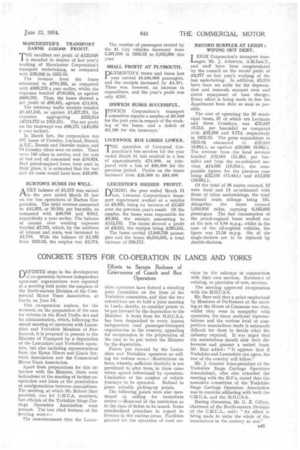CONCRETE STEPS FOR CO-OPERATION IN LANCS AND YORKS
Page 59

If you've noticed an error in this article please click here to report it so we can fix it.
Efforts to Secure Redress of Grievances of Coach and Bus Operators DEFINITE steps in the development of co-operation between independent operators' organizations were reported at a meeting held under the auspices of the North-eastern Division of the Commercial Motor Users Association, at Leeds, on June 14.
This co-operation centres, for the moment, on the preparation of the case for reforms in the Road Traffic Act and its administration, which, following the recent meeting of operators with Lancashire and Yorkshire Members of Parliament, it is proposed to present to the Minister of Transport by a deputation of the Lancashire and Yorkshire operators, but also including representatives from the Motor Hirers and Coach Services Association and the Commercial Motor Users Association.
Apartfrom preparations for this interview with the Minister, there were indications at the meeting of further cooperation and hints at the possibilities of amalgamations between associations. The meeting, at which Mr. Robert Barr presided, was for C.M.U.A. members, but officials of the Yorkshire Stage Carriage Operators Association were present. The two chief features of the Meeting were :— The announcement that the Lanca shire operators have formed a standing joint committee on the lines of the Yorkshire committee, and that the two committees are to hold a joint meeting in Leeds, shortly, to consider points to be put forward by the deputation to the Minister. A letter from the M.H.C.S.A. has been despatched to every known independent road passenger-transport organization in the country, appealing for co-operation in the preparation of the case to be put before the Minister by the deputation.
Points put forward by the Lancashire and Yorkshire operators as calling for redress were :—Restrictions on fares, whereby sufficient elasticity is not permitted to alter fares, in those cases where agreed beforehand by operators. Limitation of the number of vehicle journeys to be operated. Refusal to grant suitable picking-up points.
The following points were also mentioned as calling for immediate review :—Removal of the restriction as to the class of ticket to be issued. Some standardized procedure in regard to licences in the various areas. Facilities granted for the operation of road ser vices by the railways in conjunction with their own services. Extension of existing, or provision of new, services.
The meeting approved co-operation with the M.H.C.S.A.
Mr. Barr said that a point emphasized by Members of Parliament at the meeting at the House of Commons was that, whilst they were in sympathy with operators, the many sectional representations and the various local or competitive associations made it extremely difficult for them to decide what the industry required. It was urged that the associations should sink their differences and present a united front. Mr. Barr added: "It appears that if Yorkshire and Lancashire can agree, the rest of the country will follow."
Mr. J. Granter (vice-president of the Yorkshire Stage Carriage Operators Association), who also attended the meeting with the M.P.s, stated that the executive committee of the Yorkshire Stage Carriage Operators Association was to consider affilia ting with both the C.M.U.A. and the M.H.C.S.A.
During discussion, Mr. G. E. Gilbey, chairman of the North-eastern Division of the C.M.U.A., said : "An effort is being made to unite the whole of the associations in the country as one."




























































































